010516_YKBP_A 2.pdf











2 Broadcaster Press
New Juvenile
Reforms Are
Intended To
Reduce
Commitments Of
Youths
By Bob Mercer
State Capitol Bureau
PIERRE – Big reforms take effect for South Dakota’s juvenile justice system in 2016.
More money will be spent on community services for
young offenders. Fewer youths will be placed at state and
private facilities.
If the changes work, state government will see a net savings and will cut incarceration numbers by half.
The Legislature adopted the broad package of changes
last winter.
The recommendations came from the state courts system,
the state departments of social services and corrections,
prosecutors, counselors and others who work with youth in
times of trouble.
A similar approach to reforms for adult offenders won
approval from the Legislature two years ago and is showing
success.
The hope is the juvenile reforms would reduce placements
in state or private facilities, from 314 to 208 during the 2017
budget year, and the number would decline to 175 in 2018,
146 in 2019 and 127 in 2020.
Depending upon whose estimates are used, the first full
year of the program could cost about $260,000 more because
of the up-front expenses for community services, according
to a fiscal note prepared by the Legislative Research Council.
The net reductions in expenses would begin to accumulate in the years after, according to the LRC analysis, as fewer
youths are committed to facilities.
The savings gradually would increase to $1.2 million in
the second full year, then $2.7 million and $3.7 million in full
years three and four.
The LRC report notes that Pew Charitable Trusts through
its public safety performance project “determined the average annual out-of-home placement cost for state facilities,
detention and jail, and private placements was $59,281, based
on program cost data provided by the Department of Corrections.”
Basically the Legislature, the courts and the governor
want community intervention rather than commitments to be
used whenever possible.
New state laws that take effect Jan. 1 limit when a state
court may commit a child to the state Department of Corrections for cases of delinquency or CHINS – child in need of
supervision -- or for probation violations
The alternative approach moving into place calls for
community response teams to make recommendations for
community treatment options when there is a potential commitment to DOC. The judge on the case may accept, reject or
modify the recommendation.
Probation options for the courts now will be limited generally to four months maximum or eight months in instances
of intensive probation, with an overall combined limit of 12
months.
The court system is establishing rules in January for a grid
of responses to probation violations.
State law also now calls for four common offenses -- petty
theft; intentional damage to property less than $400; under
age purchase, possession or consumption of alcohol by
youths younger than 18; and truancy – to be handled outside
the normal juvenile courts process and would be punished as
citations carrying a maximum $100 fine and restitution.
Overseeing the reform efforts is a 19-member council appointed by the governor, the Supreme Court chief justice, the
Legislature’s majority leaders and the attorney general.
The oversight council’s chairman is Greg Sattizahn, administrator for the state Unified Judicial System. Vice chairman is
Jim Seward, the governor’s legal counsel and a former county
prosecutor.
Krebs Announces Initiated
Amendment Validation
PIERRE – Today, Secretary
of State Shantel Krebs announced that an Initiated
Amendment to the South
Dakota Constitution to Provide
for State Legislative Redistricting by a Commission was
validated and certified to be
on the November 2016 general election ballot as a ballot
measure that the citizens will
vote on. The sponsor turned in
43,198 signatures to the Secretary of state’s office. An Initiated Amendment to the Constitution required a minimum
of 27,741 signatures from
South Dakota registered voters. Once the signatures were
delivered to the Secretary of
State’s office, a 5% random
sampling was conducted. It
was determined that 70.2% or
30,335 of 43,198 signatures
were in good standing.
Secretary Krebs stated that
“South Dakota has a long and
rich history of citizens taking
issues directly to the voters.
After serving 10 years in the
legislature it is an enjoyable
role for me to act as an impartial official in the initiated
measure process and ensure
that the citizens of South
Dakota have a chance to voice
their concern in regards to the
ballot measures that meet the
signature threshold.”
Read
and
Recycle
Winter Auction
Sunday Jan. 10 , 2016 12:30 PM
th
National Guard Armory (603 Princeton) Vermillion, SD
Lunch Served
Auctioneer notes: fishing boat, lift chairs, pump
organ, wheel chair, household and tools.
Joe Sipple Estate: 14 ft. alum craft boat with 25 hp. Mercury
motor, standing lamps, kitchenware, antique round table w
chairs, book case, dressers, steel bed frame, Casio key board,
antique pump organ (great shape), cedar chest, fishing poles,
push mower, bike, step and extension ladder, steel shelving units,
misc. old tools and much more.
Lela Kruse: Invacare electric wheel chair, tools, office chair, old
paintings, anvil, refrigerator, turkey fryer, gun cabinet, shelves and
much more.
Cathy Ezrailson: Brass and crystal chandelier, Gordon
laughead piano, couch, large dining room table w leaf and
matching cabinet, 4 high bar stools, king size bed and solid
cherry head board, mirror, roll top desk, 3 matching chairs, large
cupboard.
Lisa Hardy: couch, sitting chair, lift chair, dresser, dresser w
mirror, reg. bed, queen bed, end tables, lamps, t.v. trays, sitting
bench, antique dresser w/ mirror.
Elsie Wirth: wheel chair, walker, large assortment of jars, tools,
blue jars, antique singer sewing machine, kitchen pots, misc.
glassware, dressers and antique glassware.
Guest consigner: Lift chair, sitting chair, glassware, milk glass,
Blue Bird dishes, and children dishes.
Phyllis Noble: hide-a-bed, queen memory foam mattress,
desk, china hutch, table, end tables, dresser w/mirrors, lamps,
computer, microwave, armoire, jewelry, small dresser, misc.
kitchen materials, filing cabinet, and much more.
Madsen Auction Service
Gary Madsen 605.638.0643
Hazen Bye 605.670.0422 & Jim Brady
January 5, 2016 www.broadcasteronline.com
Dave Says
You can catch up later
from what you put
into your 401(k).
There would be
going forward, for
sure, but I think
you’ll be able to
make that up pretty
quickly.
—Dave
BY DAVE RAMSEY
Courtesy of EveryDollar.com
Dear Dave,
I work in IT, and I recently learned that
I’ll be losing my $88,000 a year job at the
end of February. We’re debt-free, except
for our home, and we have a full emergency fund in place. The problem is we
just cash-flowed one daughter’s wedding,
and we’ll be paying for another daughter’s college soon. I’ll receive a severance
package of around $30,000 to $40,000, but
we’re wondering if I should stop contributing to my 401(k) and stockpile cash
until another job comes along.
Steve
Dear Steve,
You’ve done a great job handling
your money, so going a couple of months
without contributing to your 401(k) isn’t
going to mean the difference between
retiring with dignity and eating Alpo in
your golden years.
In this case, I would temporarily stop
funding the 401(k). You’re in a highdemand line of work, so I think you’ll
probably land something soon and maybe
even get a raise in the process. The main
thing is to be intentional. Go ahead and
start networking and lining up interviews
now. Try to land something as soon as
possible so that you can start at the end
of February or the first of March. At that
point, you could look at the severance
package as a signing bonus.
There’s not much lost between now
and then with what you’d actually gain
No New Years
debt next time?
Dave
RAMSEY
Dear Dave,
We’ve always
just assumed that
we would use credit cards for Christmas,
and accepted the fact that there would be
a mountain of debt to pay off in January
and February. Can you tell us how to
make it through the Christmas season
next year without accumulating debt?
Carol
Dear Carol,
It’s just common sense, but it’s easy to
find something in the mall you “just have
to buy.” That’s where problems start.
Giving is not meant to be stressful on
your finances. Give with the right intentions, and give with a financial plan in
mind that does not include debt. Another
thing to remember is Christmas always
falls on December 25th. Don’t wait until
Thanksgiving to realize it’s right around
the corner. You could even get a real jump
on things, and set a little bit aside each
month toward Christmas starting right
now!
—Dave
EveryDollar is a simple, online budgeting tool that helps users set a monthly
budget and seamlessly track expenses.
For more information, go to www.everydollar.com.
We’re
all ears.
Giving is a wonderful thing if your
intentions—and your finances—are in
the right place. But don’t let yourself get
Your opinion is something
trapped in the shopping bonanza just
we always want to hear.
Questions?
because everyone else is doing it. It’s all
Call, write us or contact Comments?
too easy to try to justify overspending in
us via e-mail and let us
the weeks ahead just because it’s a gift.
Story Ideas?
It’s pretty simple. Look at your budget, know how we are doing.
and see what you can afford to pay cash
for during the holiday season. Once you
and your spouse agree on this amount,
make a list, check it twice and stick to it!
201 W. Cherry •Vermillion, SD 57069
Include the names and amounts you are
going to spend on each person or charity. 605-624-4429 • classifieds@plaintalk.net
A Frugal Dane,
Governor Finds Cash To Buy Down
State’s Debts
By Bob Mercer
State Capitol Bureau
of Finance and Management
spends roughly six months
putting together the recomPIERRE – Spending excess mendations each year, while
cash to pay down debts, and the legislators have approxiin turn setting free smaller
mately 35 to 40 half-days to
streams of revenue for years build from those recommento come, is a technique Gov.
dations the appropriations
Dennis Daugaard likes to use. bill that becomes law.
Call it the anti-gimmick of
Much of the plan from
state government budgeting: Daugaard this year involves
Reduce long-term obligaputting money into educations, and redirect to other
tion. He would use $42.3
purposes the money that
million of cash to pay off
had been going for annual
some of the bonds for the
payments.
state universities and public
This brand of smart thrift technical institutes.
could play a significant role
In turn there would be
in the budget that Daugaard
enough money freed from the
recently proposed for the
bond payments to buy-down
coming year.
tuition for resident on-camHe wants the Legislature
pus students at those same
to agree with his plan to
six universities and four tech
transfer about $47 million of schools.
cash from various accounts
Other chunks of cash
– including $27.4 million from would be used to increase by
the state’s budget reserve,
$2.1 million the endowment
a move that should please
for needs-based scholarships
those legislators who for
for state university students
years argued the reserve
– earnings from the endowshould be used more frement’s investments pay for
quently -- and also cut about the scholarships – and to
$12.6 million from the existprovide $2.2 million for three
ing budget.
pilot schools at the K-12 level
Then he would spend
to try new approaches for
$55.7 million on one-time pur- American Indian students.
poses and make about $4.5
From where would this
million of increases in other
cash come? “We’re rakparts of the ongoing budget. ing every cash source we
Legislators who are mem- have,” said Jason Dilges, the
bers of the two committees
governor’s commissioner for
that oversee state governfinance and management.
ment’s budget and spending
Here’s a summary of those
had long complained about
sources.
millions of dollars squirreled
Budget reserve – The
away in dozens of accounts
governor’s plan calls for
throughout state governtaking $27.4 million from this
ment.
source.
The state Department of
Money that is unobligated
Legislative Audit even preat the end of state governpares a report annually – this ment’s fiscal year on June 30
year it contains 325 pages
can be shifted to the budget
-- that provides lawmakers
reserve. The leftover money
a summary of the cash, revis often called a surplus.
enue and spending for those
The budget reserve held
accounts.
$105.2 million at the end of
The Legislature still wants fiscal year 2015 on June 30.
more authority over budget- There also was $21.5 million
ing. But timing is a challenge. of surplus from fiscal year
The governor’s Bureau
2015 that was to be trans-
Insulated & Waterproof Boot SALE!
FREE
Socks
Available in Safety & Non-Safety Toe
Boston Shoes to Boots
312 W. 3rd • Yankton • 665-9092
Maid Service
“Yankton’s Clean Team”
Housecleaning weekly, bi-weekly, bi-monthly,
monthly, spring/fall cleaning, new home
construction cleaning, move-in/move-out cleaning
Housecleaning makes a great gift for Christmas, Valentine’s Day,
Mother’s Day, anniversaries, new moms, elderly,
illness, and holiday cleaning.
Serving Yankton,
Vermillion and
Hartington for 26 years.
Please call Sherry at 605-665-5266
and get your house on the schedule or
www.welovetocleanyankton.com
ferred to the budget reserve
after fiscal year 2016 began
July 1, 2015.
The governor wants to
take $27.4 million from the
budget reserve in fiscal year
2016. This would reduce the
budget reserve’s ending balance to $99.3 million on June
30, 2016.
Much more money
could be kept in the budget
reserve. State law limits the
amount in the budget reserve
to 10 percent of the generalfund appropriations for the
previous year.
For fiscal 2016, that upper
limit for the budget reserve
would be $137.2 million. Instead, after the transfer out,
the remaining amount will
be approximately $38 million
below that threshold.
South Dakota Risk Pool
– The governor wants to
transfer $3,375,000 from this
source.
The risk pool was created
in 2003 to provide health
insurance that could be purchased by people who otherwise couldn’t get insurance.
Insurance carriers paid into
the fund an assessment of 25
cents per covered person in
their plans.
The federal Affordable
Care Act now makes the pool
unnecessary. The risk pool
will be removed from state
law Jan. 1, 2017.
As of June 30, 2015, the
risk pool contained slightly
more than $3.3 million. The
fiscal year 2015 revenue was
$1,385,761 and the payouts
totaled $1,933,480.
Petroleum release compensation fund – The plan
calls for taking $3.5 million
from this source.
Fuels shipped into South
Dakota are charged a special
fee of 2 cents per gallon, in
addition to any other state
taxes on them. The petroleum release compensation
fund receives 10.65 percent of
the revenue from the 2-cent
fee.
In the fiscal year 2015
that ended June 30, the fund
received $1,890,413 and paid
out $1,147,037. The pooled
cash as of June 30 was
$4,749,291.
The state Department of
Environment and Natural
Resources operates this fund
for removal of abandoned
fuel tanks and for responding to unintended spills,
leaks, discharges and other
releases.
Department of Corrections – The plan calls for
taking nearly $5 million of
cash from an assortment of
sources.
Current budget cuts – The
plan calls for reducing spending within the fiscal year 2016
budget in various places
by a total of $12.6 million in
general funds. This would be
Governor
Daugaard’s
Red Tape
Review
Targets
Bottled
Drinking Water
PIERRE – The Department of
Environment and Natural Resources (DENR) has streamlined regulatory oversight of
companies in South Dakota
that produce bottled drinking
water.
Gov. Dennis Daugaard
transferred the regulation of
bottled drinking water from
the Department of Public
Safety to DENR through an
executive reorganization
order earlier this year. After a
review of the regulatory program administered by Public
Safety, DENR repealed the existing state rules and adopted
new DENR rules that simply
reference the pertinent sections of federal U.S. Food and
Drug Administration (FDA)
regulations for the production
of bottled drinking water.
“These rule revisions make
regulatory oversight of water
bottlers more efficient by
having just one set of rules to
follow,” said DENR Secretary
Steve Pirner. “Using Governor
Daugaard’s Red Tape review
process, we were able to
eliminate seven sections and
1,023 words from the state’s
administrative rules, but having the federal rules in place
will still ensure bottled drinking water is safe.”
Prior to the rule revisions,
which will become effective
in early January, drinking
water bottlers were subject to
both state administrative rules
and federal FDA regulations.
There are nine companies
currently bottling drinking
water in South Dakota. Bottlers are required to routinely
submit water quality sample
results to verify compliance
with regulatory requirements.
Get your ad in the..
Two Locations
to Serve You!
Locally Owned and Operated Since 1972
3211 E. Hwy. 50 • Yankton, SD
605-665-4540-• 800-526-8095
partially offset by $4.5 million
of increased spending within
the 2016 budget in various
places.
State government's
employee health insurance
program is over-funded by
$8.2 million and the money
can't be saved because the
practice isn't allowed for federal funds. Utility expenses
are expected to come in more
than $1 below prior estimate
and state government's share
of aid to K-12 schools can
be reduced by $3.1 million
because enrollments didn't
rise as much as expected and
local property taxes came in
higher than expected.
745 E. Hwy 46 • Wagner, SD
605-384-3681 • 800-693-1990
O r v i s i t u s a t : w w w. m a r k s i n c . c o m
Classifieds
Today!
CALL: 624-4429 or FAX: 624-2696
EMAIL: classifieds@plaintalk.net
ONLINE: BroadcasterOnline.com
DROP BY: 201 W. Cherry, Vermillion





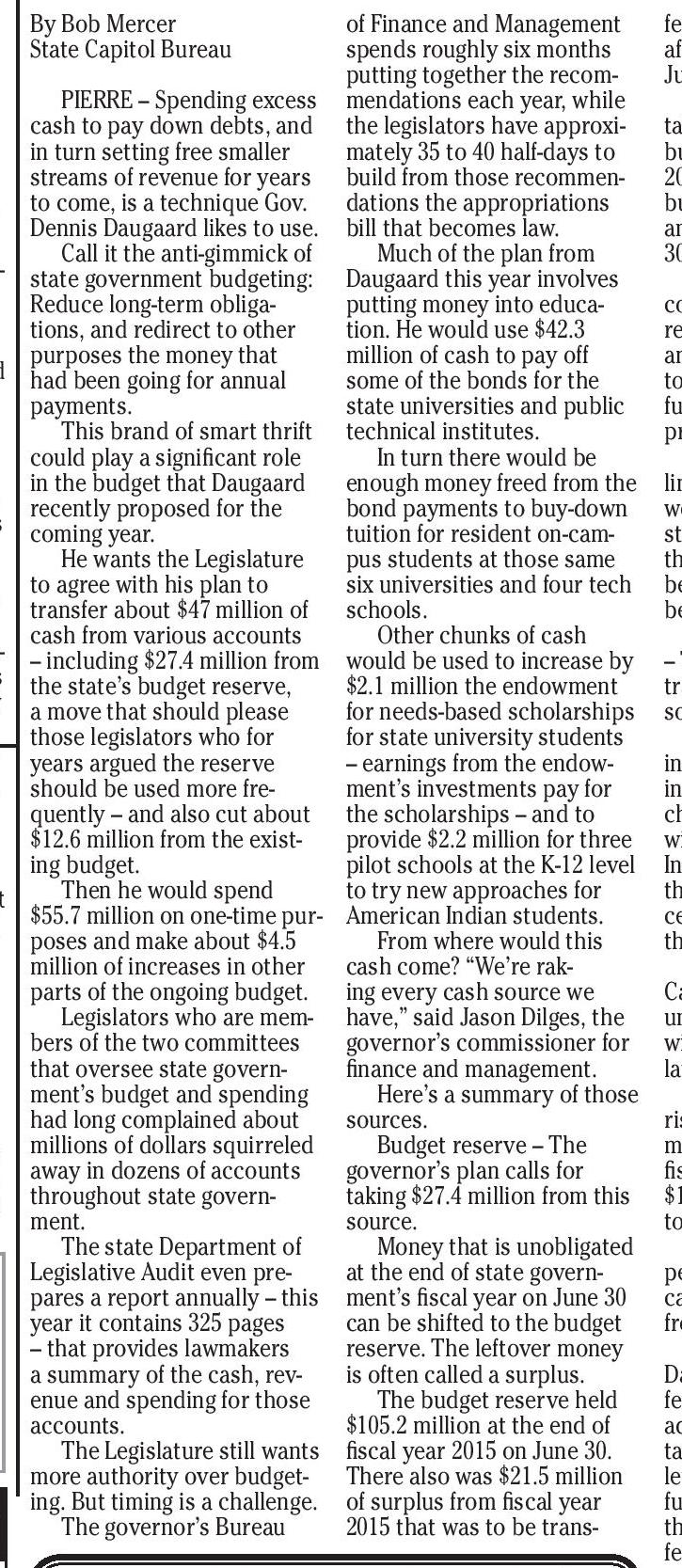

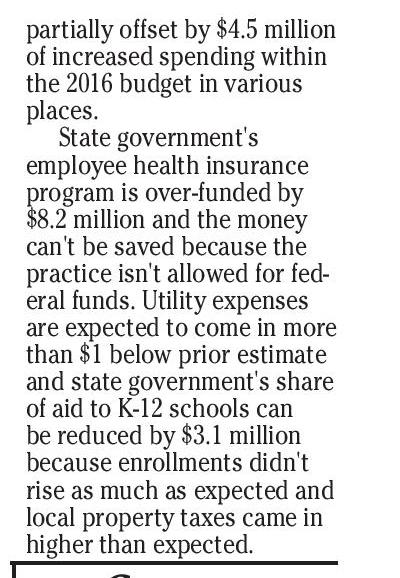
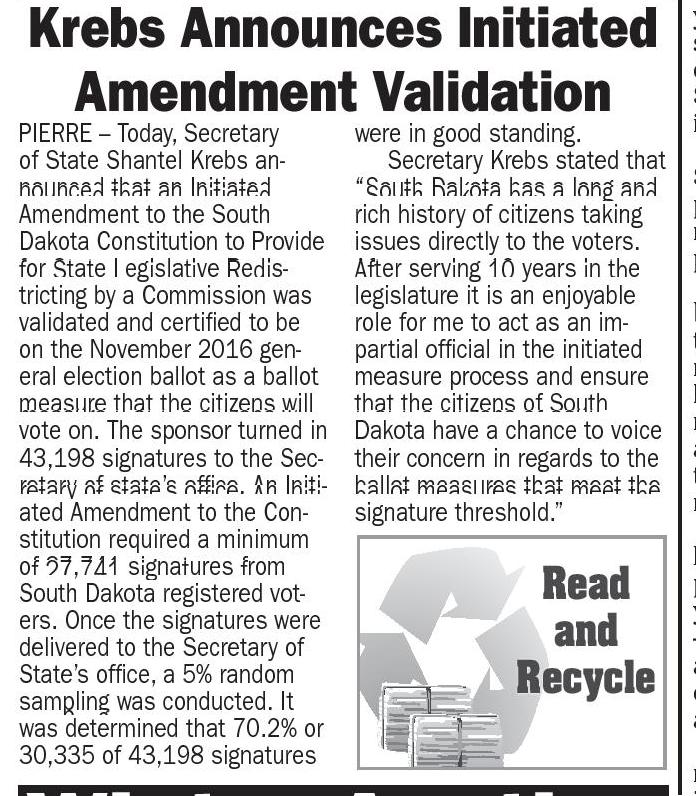

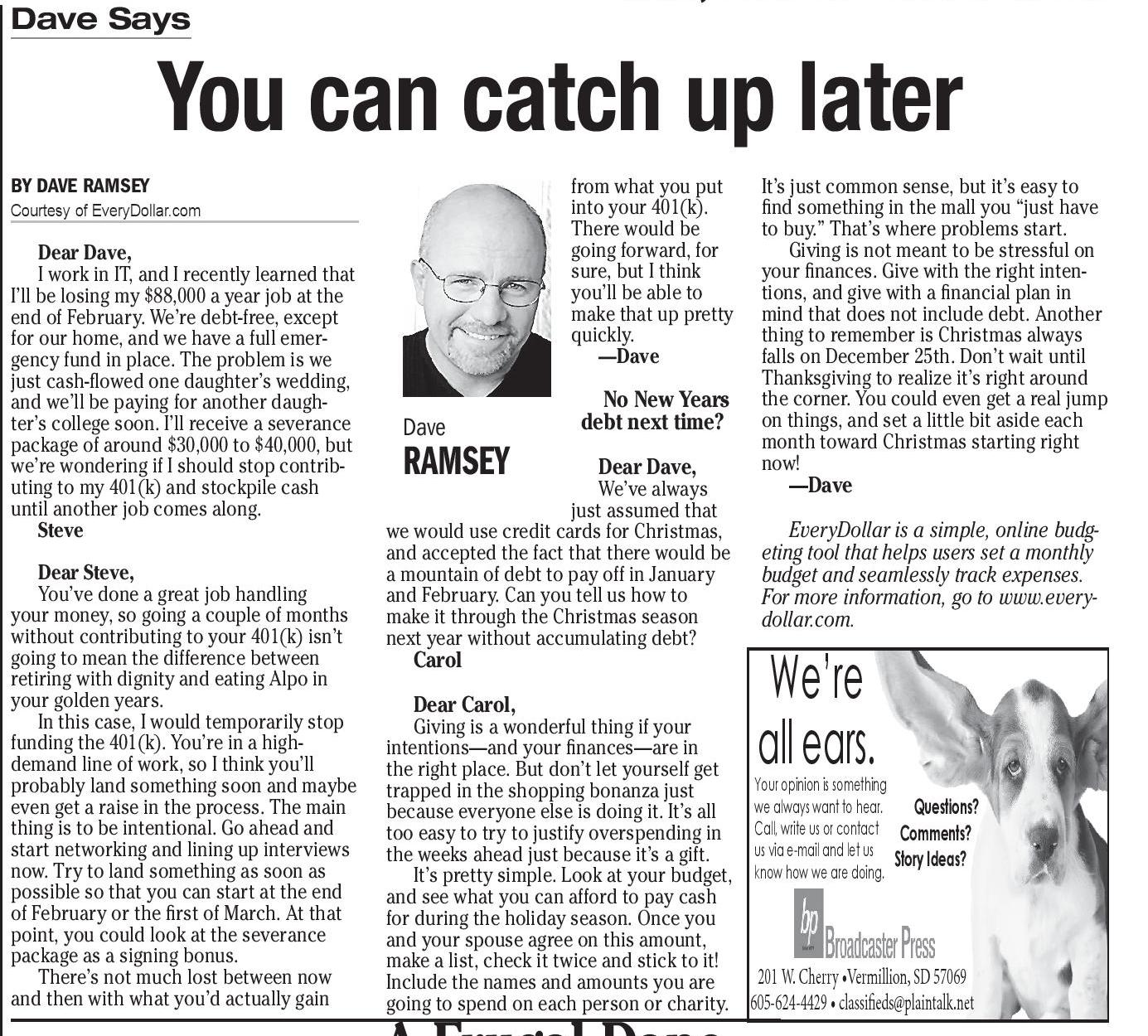


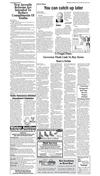

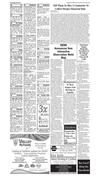
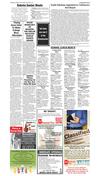
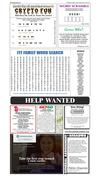


 Previous Page
Previous Page






